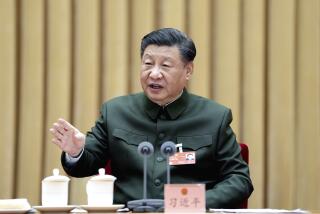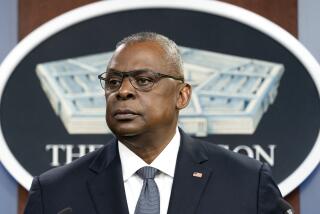Defending his goals in Afghanistan
- Share via
WASHINGTON — The top U.S. commander in Afghanistan staunchly defended his emphasis on stabilizing the country with a troop-intensive counterinsurgency strategy, arguing Thursday that reducing U.S. aims in the nation would be “short-sighted.”
Speaking in London, Army Gen. Stanley A. McChrystal said he opposes strategies that would require fewer troops and focus on fighting Al Qaeda and the Taliban leadership through drone attacks, airstrikes and similar approaches, according to transcripts and audio recordings of his remarks.
Such an approach is favored by some Obama administration officials, including Vice President Joe Biden.
However, counterinsurgency advocates have said that a narrow war effort would leave the Afghan government unprotected from encroachment by the Taliban or other extremist organizations.
The strategy debate is at the heart of a sweeping review requested by President Obama as the administration grapples with a tainted Afghan presidential election, escalating violence and mounting allied casualties. McChrystal was among officials taking part in a White House strategy meeting Wednesday, according to administration officials. He participated by video-teleconference.
In his remarks Thursday to the International Institute for Strategic Studies, he argued that stabilizing Afghanistan is crucial to the political health of the wider region.
“A strategy that does not leave Afghanistan in a stable position is probably a short-sighted strategy,” he said.
McChrystal has submitted a request for thousands of additional troops, but the White House has put the request on hold while it reviews the broader strategy.
In his speech to the London-based policy group, McChrystal did not make an explicit plea for more troops, but said that the White House debate was over the goals and objectives of the Afghanistan mission.
“People are re-looking what our goals and objectives are, and redefining and clarifying those. And that is helpful,” McChrystal said. “I don’t think if we align our goals and our resources we will have a significant problem. Our problem will be if we didn’t.”
But a gap has emerged between military and civilian leaders. The White House has insisted that its goal remains the same: destroying Al Qaeda and preventing its ability to rebuild in Afghanistan or Pakistan.
Military leaders said they are willing to consider a more limited mission if the overall goal is less ambitious, such as simply disrupting Al Qaeda. Destroying the organization in Afghanistan, on the other hand, necessitates a stable country, which in turn requires a broad counterinsurgency effort, military experts say.
McChrystal spoke in London as the U.S. Senate debated a proposal to demand he testify about the war before lawmakers. Sen. John McCain (R-Ariz.) pushed for the resolution, which was defeated on a 59-40 vote along party lines.
McChrystal repeated his view that the U.S. and its allies have not provided enough resources for the operations in Afghanistan, blaming the shortfall for a “serious and deteriorating” situation.
He said the military must look at fighting differently.
“We must redefine the fight,” McChrystal said. “The objective is the will of the Afghan people. We must protect the Afghan people from all threats, from the enemy and our own actions.”
The war, McChrystal said, was ultimately political.
“At the end of the day, we don’t win by destroying the Taliban, we don’t win by body counts, we don’t win by number of successful military raids or attacks,” he said. “We win when the people decide we win.”
McChrystal was asked repeatedly about the strategy debate in Washington, specifically whether delays in sending more troops would undermine the war effort. He said he supports the debate in Washington because, whatever the outcome, the administration would be more likely to pursue its strategy with firmer resolve.
“If that debate is necessary for a strong decision that is backed by resolve, then I think we have to take that time,” McChrystal said.
--
More to Read
Get the L.A. Times Politics newsletter
Deeply reported insights into legislation, politics and policy from Sacramento, Washington and beyond. In your inbox twice per week.
You may occasionally receive promotional content from the Los Angeles Times.










